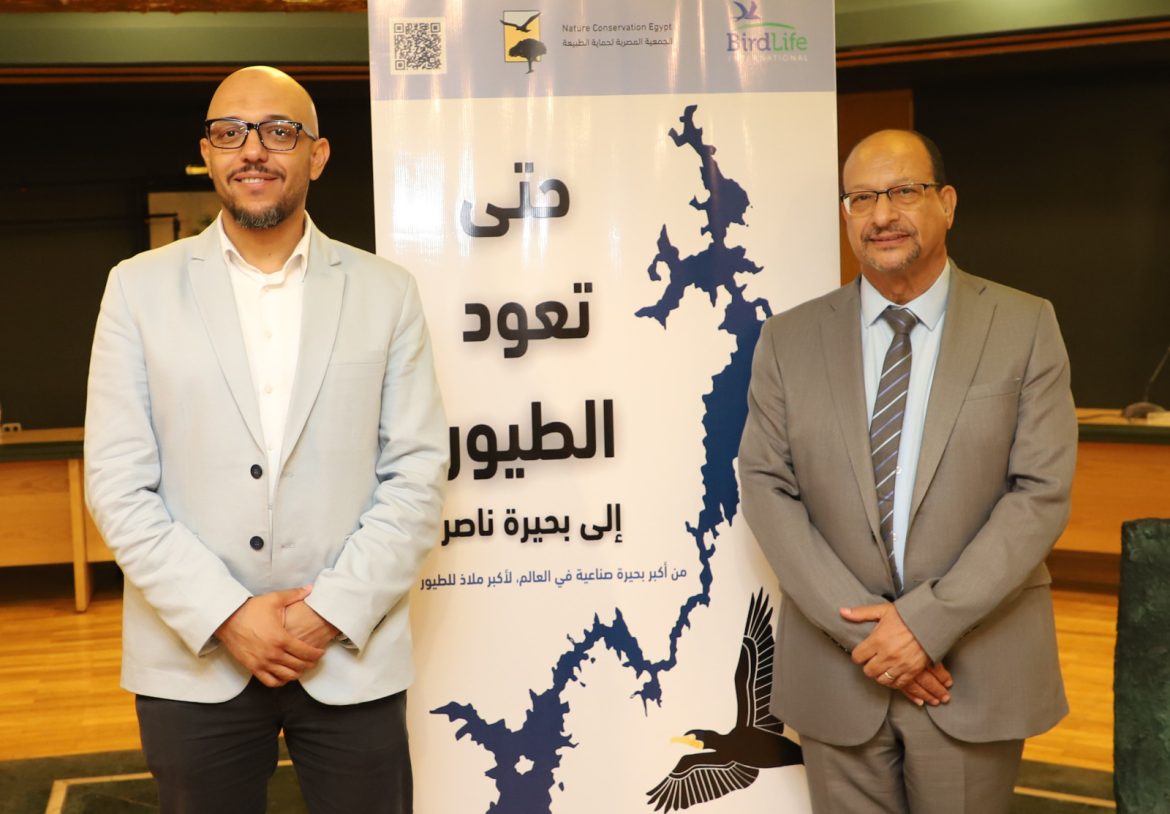Cairo – Hadeer Elhadary
At a press conference held today at the Journalists Syndicate in Cairo, the Nature Conservation Egypt (NCE), headed by Dr. Khaled El-Nouby, and the Environmental Writers and Development Association, chaired by Dr. Mahmoud Bakr, officially launched their national campaign titled “Until the Birds Return”. The initiative calls for the renewal of Egypt’s bird hunting ban in Lake Nasser for an additional year (2025–2026), following two years of tangible environmental success.
The event was attended by Dr. Ekramy El-Abassiry, General Director of Southern Protected Areas, Khaled El-Balshy, President of the Journalists Syndicate, along with environmental experts, media representatives, civil society organizations, and government officials.
Egypt: A Strategic Stopover for Migratory Birds
In his opening remarks, Dr. Khaled El-Nouby emphasized Egypt’s pivotal role in global bird migration, stating that the country serves as a strategic stopover for millions of migratory birds each year, traveling from Europe and Asia through the Great African Rift Flyway, one of the world’s most critical and ecologically sensitive migration routes.
In addition to migratory species, Egypt is home to a wide variety of resident bird species that depend on its diverse ecosystems year-round. However, El-Nouby warned that Egypt’s natural habitats, especially Lake Nasser, have increasingly become arenas for severe environmental violations disguised as eco-tourism activities.
Shocking Violations: Foreign Hunters and Banned Tools
According to El-Nouby, during the 2022–2023 hunting season, NCE documented at least 15 illegal hunting expeditions to Lake Nasser involving 87 foreign hunters, mostly Europeans. Some of these individuals are facing environmental charges in their home countries.
These hunting trips used semi-automatic rifles and internationally banned audio lures to attract and shoot rare and endangered birds. Based on the 2023 BirdLife International Report, Egypt is now listed among the top nine countries in urgent need of regulatory action, with over 5.7 million birds illegally killed every year using traps, long nets, glue sticks, and call devices.
El-Nouby warned of a growing shift toward other fragile ecosystems, particularly Egypt’s oases, as hunters seek alternative grounds following increased surveillance around Lake Nasser.
The Impact of the 2023 Hunting Ban
Faced with mounting violations, Egypt’s Ministry of Environment issued a landmark decision in 2023 to ban hunting in Lake Nasser. El-Nouby described the move as transformative, enabling the lake to recover ecological balance and allowing rare species to return.
One of the most celebrated outcomes was the first recorded breeding of the Village Weaver bird in Abu Simbel—an unprecedented scientific discovery highlighting the region’s improving biodiversity.
Economically, the ban opened new doors for eco-tourism and birdwatching, with some former hunters transitioning into environmental guides, thus supporting local livelihoods.
A Call for Renewal and Expansion
“Until the Birds Return” seeks to extend this success into a national model for managing ecologically sensitive areas. The campaign aligns with Egypt’s commitment to the Rome Strategic Plan (2020–2030), an international initiative aiming to reduce illegal bird hunting by 50% by 2030.
Dr. El-Nouby outlined the campaign’s key goals:
- Renew the hunting ban in Lake Nasser for 2025–2026 with no exceptions.
- Expand the ban geographically to include Egypt’s oases and other vulnerable habitats.
- Strictly enforce environmental laws, prosecuting offenders regardless of nationality.
- Promote eco-tourism as a sustainable alternative for local communities.
He stressed that protecting living birds could yield five times the economic return compared to killing them, especially when paired with Egypt’s unique position as a global biodiversity corridor.
Engaging the Public and Civil Society
The campaign includes awareness activities and on-the-ground monitoring in collaboration with Egypt’s Ministries of Environment, Tourism, and Interior. It also aims to empower the public to report violations and embrace wildlife conservation as part of Egypt’s national identity.
“The voices of institutions and people are the last line of defense for nature,” El-Nouby said. “The silence of birds must not become our future.”
Supporting Voices from the Event
Dr. Mahmoud Bakr, President of the Environmental Writers and Development Association, highlighted the global importance of Egypt’s role, stating:
“When we protect birds in Egypt, we protect global biodiversity. What we conserve here echoes across the world.”
Bakr announced that his association would:
- Train young journalists on biodiversity terminology and environmental reporting.
- Organize field visits to Lake Nasser to allow media professionals to observe migratory birds firsthand and report from the ground.
Dr. Ekramy El-Abassiry, General Director of Southern Protected Areas, emphasized the scientific rigor behind Egypt’s conservation efforts. He pointed to the annual waterbird census, conducted across major wetlands including Lake Nasser, as a vital tool for tracking bird population trends and shaping legislation.
“The census helps us understand what species are increasing or declining. It directly informs our decisions and legal protections.”
Khaled El-Balshy, President of the Journalists Syndicate, expressed his strong support for the campaign and environmental journalism in general.
“The syndicate is the house of all societal issues,” he said. “We are committed to supporting every effort that defends our environment and raises public awareness.”
A Unified National Responsibility
The official statement released by NCE reinforced that Lake Nasser must be treated as one integrated ecosystem, not as administratively separate zones. The organization warned that failing to renew the ban would not only endanger local biodiversity but also undermine Egypt’s international reputation as a country committed to sustainability.
In closing, El-Nouby underscored the urgency of collective action: “Today, we’re not just talking about birds. We’re talking about defending life, honoring science, and standing against the silence that follows a gunshot.”




